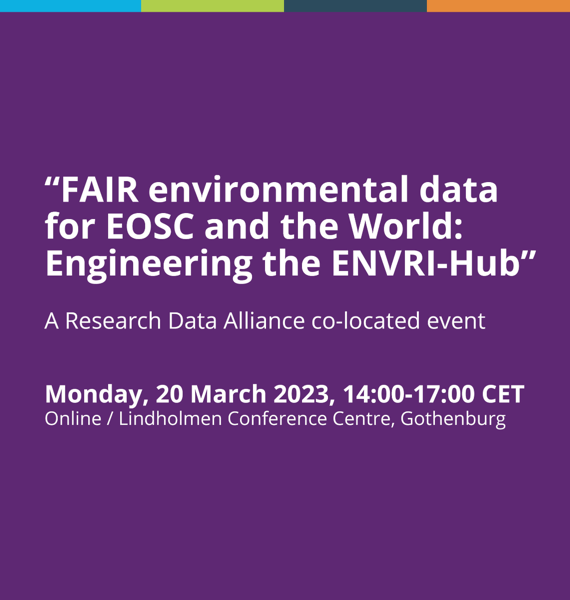
Gothenburg and online, 20 March 2023.
The power of FAIRness
Good-quality data is essential to enable successful global climate action. The European Environmental Research Infrastructures, organised in the ENVRI Community, hold a wealth of data on Earth systems critical to tackling global climate challenges. Within the ENVRI-FAIR, a Horizon 2020 project in which LifeWatch ERIC is partner, the ENVRI Community created the ENVRI-Hub, a portal of services to ensure the availability, accessibility and interoperability of this trove of European environmental data.
Meet the ENVRI-Hub
The ENVRI Community is proud to introduce the ‘ENVRI-Hub’ concept and its achievements during this co-located event. The ENVRI-Hub is the central gateway to FAIR environmental data and services the European environmental research infrastructures offer. It offers a community-built platform that combines a service catalogue, a knowledge base, information on training resources that support service providers and users, and a virtual research environment with several initial science demonstrators, all accessible through a single access interface. Through the ENVRI-Hub, the ENVRI Community directly contributes to the European Open Science Cloud, opening up this wealth of data for exploitation to all scientific users, policymakers, and private partners.
Real cases for real users
This event will demonstrate several aspects of the technical and data architecture behind the ENVRI-Hub, from assessing the FAIRness of the ENVRIs and identifying the gaps to harmonising technical implementations across different infrastructures. It will also illustrate its value in various real-world science demonstrators. Discussions will follow with a panel of experts about the integration into EOSC, the current strengths and limitations of the ENVRI-Hub and possible future developments.
Programme
Presentation of the components of the ENVRIhub by ENVRI experts
- ENVRIhub concept and architecture (Anca Hienola, ENVRI co-coordinator, FMI)
- Catalogue of services and AAI (Keith Jeffery, ENVRI-FAIR Lead in Common FAIR Policies, EPOS, UKRI)
- Knowledge base and search engine of ENVRI Hub (Zhiming Zhao, ENVRI-FAIR Lead in Common implementation and support, UvA, LifeWatch ERIC)
- Key data aspects and choices (Maggie Helström, ENVRI-FAIR Co-lead in Training and capacity building, ICOS Carbon Portal, Lund University)
- Science Demonstrators – which science case (Damien Boulanger, ENVRI-FAIR Co-lead in Implementation Atmospheric Subdomain, IAGOS, CNRS)
Q&A and discussion on the technology, ICT aspects and data
Panel discussion with the ENVRI-FAIR experts, the invited stakeholders and the audience
- Improving FAIRness of data and service to attempt convergence at the ENVRI level
- Future needs of the hub for ENVRI, Europe and the World
- Integration into EOSC, consequences, opportunities, needs for collaboration and co-development
- Relevance for science, consequences for data FAIRness
- Interoperability of variable descriptions
- Sustainability of the hub from the technical point of view
Panel members: ENVRI-FAIR presenters, Barbara Magagna (GO FAIR), Mark van de Sanden (SURF, EOSC Future), Ville Tenhunen (EGI)
Moderators: Angeliki Adamaki (Co-lead in WP5 of ENVRI-FAIR, Common requirements and testbed for (meta)data services, community standards and cataloguing, ICOS Carbon Portal, Lund University), Jacco Konijn (Part of ENVRI-FAIR communications strategies and tools, UvA, LifeWatch ERIC)
Practical info
“FAIR environmental data for EOSC and the World: Engineering the ENVRI-Hub”, an RDA co-located event
20.3.23, from 14:00-17:00 CET / 13:00-16:00 UTC
Pascal room, Lindholmen Conference Centre, Gothenburg, Sweden
This event is open to all.
You don’t need to be registered for the 20th RDA General Assembly to attend this event.
> Sign up here <